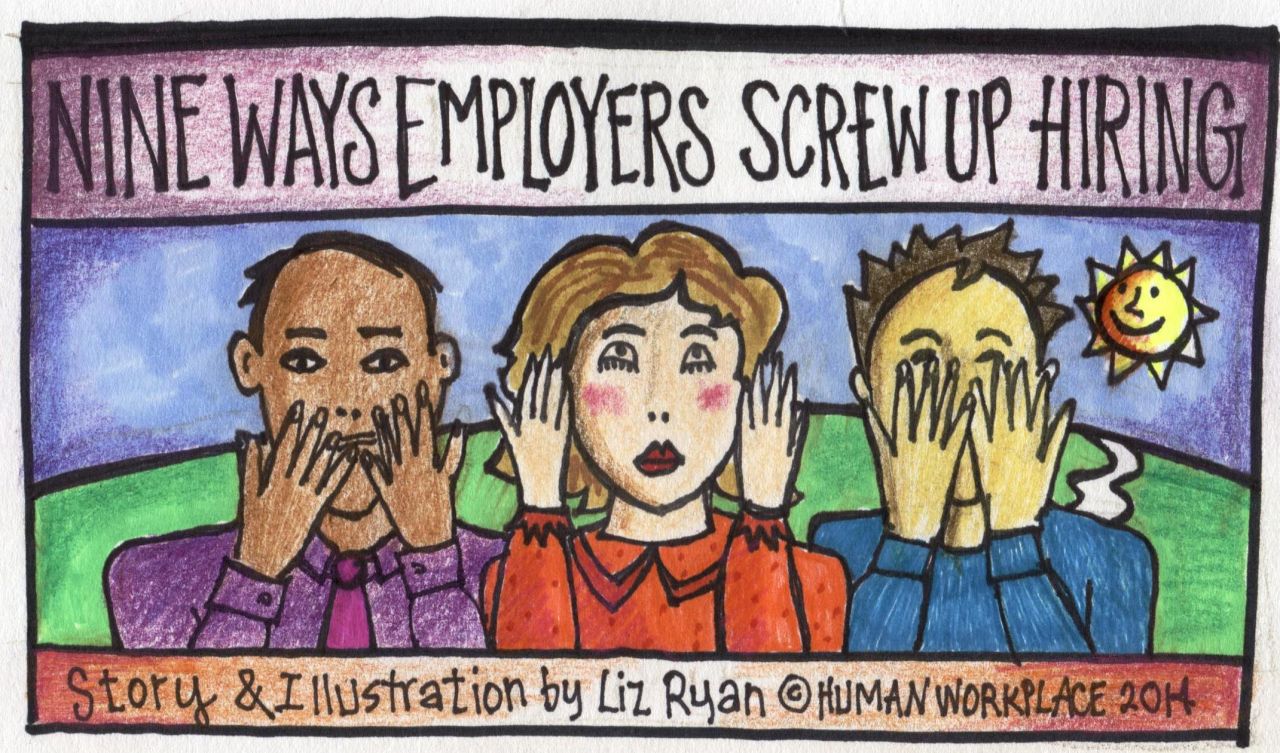“So I’m about done here,” said our client Tricia on the phone, sounding exasperated.
“Really, Trish?” I asked her. “Was it just a bad day, or are you seriously thinking about quitting your job?”
“Tell me what you think,” Tricia replied. “We lost another great candidate today – an ace. I spent a month getting to know this fellow. He met with two of our VPs, and things were going great.”
“So what happened?” asked my colleague, Molly. The three of us were together on a conference call.
“Two of the VPs who met the candidate, David, decided on their own that maybe they could get the same needle-in-a-haystack skill set in someone cheaper. They asked me to tell him the job opening was going on hold for a few weeks. That was a lie. They wanted to call a recruiter and get more candidates.”
“Wait a minute,” said Molly. “David came to you from a customer, right?”
“That’s right,” said Tricia. “No recruiting fee. My genius VP colleagues were looking to save $15K in salary by spending $30K on a search fee. I’m not sure that logic is the prevailing concept here. It was ego. ‘Who does this guy think he is, looking to command a salary like that?’ The only problem is that all the qualified people I’ve met have had the same salary requirements, and they don’t stay on the market very long.
I told the two VPs I wouldn’t lie to a candidate. We were trying to work it out internally when David called me to say he couldn’t sit around and wait for us any longer than he’d already done. He took himself out of the process.”
“Geez,” we sympathized. Tricia was silent for a minute.
“I know how to recruit great people and keep them,” she said. “I’m wasting my talent in this place, and hurting my own brand at the same time. What do you guys always say — ‘If they don’t get you, they don’t deserve you?’ That’s how I feel right now. Can you look at my resume this week? I need to work someplace where they value talent.”
Competition for talent is fierce, but too many employers are asleep at the wheel in the talent-acquisition department. They recruit like it’s mid-2009, when brilliant and accomplished people were accepting artificially-low assignments and working for peanuts. Depending on which economist you follow, we’re either just below or right back to the employment rate we experienced pre-recession. So why do so many organizations still recruit like they hold all the cards in the hiring equation?
They do it because it’s hard to change old habits, especially where fear is concerned. If job-seekers, even the most in-demand ones, have the upper hand, they might not sit in awe of a recruiter or hiring manager. They might realize that they’ve got some juice in the hiring equation. They might make demands, rather than wait around like good little sheep for the benevolent employer to extend a piddly job offer. They might expect to be treated like people!
Smart employers — the only kind you should consider working for, working with, providing services to or investing in — know that tremendous employees are the only thing that separates them from their competitors. They work hard at attracting amazing people and making their shops Human Workplaces. They value ‘soft’ stuff like employees’ priorities outside of work and trust in the workplace as much as they value quarterly results.
When they forget that it’s only their talented teams that keep them in business, here are the nine most common recruiting mistakes companies make.
Job Ads for Zombies
Recruiting mistake Number One is a job ad that insults the job-seeker even before s/he applies for the position. “The Selected Candidate will possess….” speaks right past the reader, as though he or she couldn’t possibly qualify! Can you imagine writing to a consumer, “The appropriate buyer of our products is a discerning, well-heeled individual….not YOUR sorry ass.” We don’t insult our customers.
Why would we insult job-seekers? Why would we use all of a job ad’s real estate to talk about what we need, and none of it to mention why a smart and capable job-seeker should bother applying? We can use job ads to market to the talent community, just the way we’d want to be marketed to. We can put a human voice in a job ad and sound like a person with a meaty problem to solve, not Darth Vader in search of more Battle Drones.
Black Holes Instead of Welcome Mats
If we want great people to apply for our jobs, why would our website greet them with the cheery message “Any fields left blank on this form will subject the applicant to immediate disqualification.”? Can’t we use a recruiting portal to create a relationship with a person we’re interested in attracting to our recruiting pipeline? If we care about talent, we will. We won’t use mechanical Black Hole recruiting systems (Applicant Tracking Systems in HR language) to sort living, breathing people by means of boilerplate keywords. That is the worst possible way to gauge a person’s heft or abilities!
We can put a simple logical gate into a job ad instead, like this: “If you’re interested in the role, send me a 300-word paragraph that explains why.” That paragraph will speak volumes about a candidate’s worldview, experience and ability to communicate, and make your first-pass sort easier. Can you step out of the traditional recruiting box far enough to try something new?
Just One Nobel Prize, You Say?
I was a corporate HR SVP for eons. I regularly arm-wrestled hiring managers over their fanciful-bordering-on-delusional job requirements. Over time I found that at least fifty percent of what we asked for in our job ads had no bearing on the new hire’s ability to perform the job.
You’ll snag better people, faster when you slim down the bullets on your job ad and stop looking for imaginary people who can fly and see through walls. Tell the story of the job instead of listing bullets — tell the reader what hill you’re trying to climb and why it would advance his career and grow his mojo to climb it with you. We can be human in our job ads, instead of trying to reinforce the fiction that the employer is the only one with a decision to make.
Our Computer Will Speak to You Now
Your first response to a new job applicant must come from a human being, if you want great people on your team. You can’t send a terse auto-responder that uses the passive voice, like “Your application has been received” and expect people with mojo and talent to stick around. Where does all the zombie corporate language come from, anyway? It can’t help you. It can only send the most-in-demand candidates scurrying off to join your competitors.
This May Take Awhile
We teach HR folks and the hiring managers they work with that five business days is the longest you can keep a live applicant waiting to hear from you. We must assume that the brilliant people you’re considering for employment have other active opportunities. Two, three and four-week periods of radio silence signal “We don’t give a hoot about you” and encourage your best new hires to find people who think more highly of their time and talents.
We’ll Call You When We Want To
If you haven’t got a person in your recruiting team assigned to handle candidate queries, give your best communicator that responsibility this week!
A candidate who’s looking at your company is like a buyer thinking about buying your house. Unless you’re overwhelmed with talented contenders for your job openings, you can’t afford to let a candidate’s question go unanswered. It’s not even a matter of the information you provide as much as it is a test of your organization’s attention to people in your selection pipeline.
As we tell job-seekers, “If they don’t love you now, while they’re considering making you an offer, when will they ever love you?”
Brainless Reference-Checking
I have often been tempted to hang up the phone on a clueless and officious reference-checker who couldn’t have less interest in hearing about person they were checking references for. I wanted to share stories and insights about the gifts of the candidate I was trying to recommend, but the caller wanted to ask me questions like “Was he punctual?” and “Is he proficient in Excel?”
“Gee, I don’t really know,” I’d be forced to say, “since he worked for me as VP of Training and Development.” Why bother reference-checking if you’re going to make it a pointless, check-a-box affair? That’s lazy and unprofessional, not to mention a disservice to your customers and your shareholders.
Third-Degree Interviews
Every adult knows how to hold a casual let’s-get-to-know-one-another conversation. Anyone who lacks that skill is unsuited for a management position.
So why would we toss the trusty human script that has helped millions of people get to know one another for millennia in favor of a stupid, robotic list of mandatory interview questions?
We insult our candidate’s intelligence when we ask him questions from a list, and we lower our own IQ by fifty points. Throw away the script and start your next interview by asking “So, do you have any questions for me as we get started?”
Your applicant’s questions will tell you much more about his or her brain activity than scripted answers to your goofy scripted questions.
Toxic Lemonade Mindset
The biggest hiring screw-up, of course, is the mentality that tells employer-side interviewers they are in the driver’s seat when the 2014 talent market says otherwise. Employers who can stay human in the selection process will get the best talent every time. The others will get sheep and lemmings. God bless them all, but be careful who you go to work for. When you spend enough time around pod people, you can turn into one yourself.
This article was written by Liz Ryan from Forbes and was legally licensed through the NewsCred publisher network. Learn more about SmartRecruiters, the only platform managers and candidates love.











